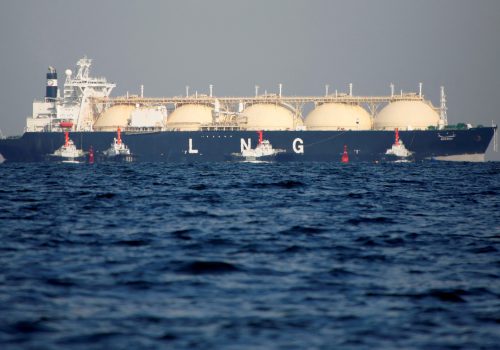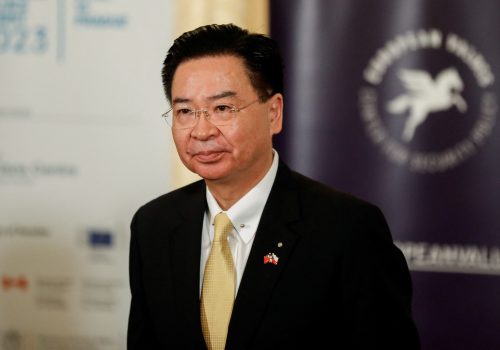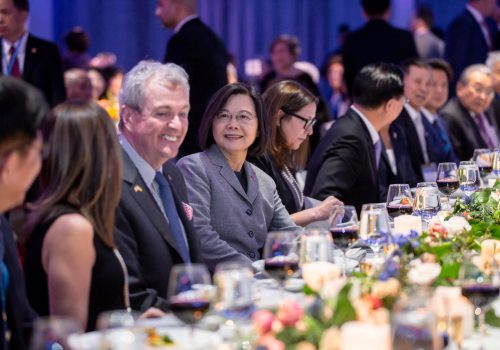Get up to speed on Taiwan’s upcoming elections

All eyes will be on Taiwan on January 13, 2024, as Taiwanese voters head to the polls to elect their next president. Even with the elections two months away, the campaign has already been full of twists and turns. Like previous Taiwanese elections, this race has the potential to drastically change the future of Taiwan and East Asian regional stability. Beyond Taiwan’s global geopolitical importance, this election also marks the end of President Tsai Ing-wen’s era of leadership. After eight years of leading Taiwan through relative stability, Tsai is term-limited from running for office again. Regardless of who wins the presidential race, there will be a new captain at Taiwan’s helm.
In this first installment of Taiwan Election Watch, we will provide some background on the campaign from our perspective on the ground in Taipei. Keep an eye out for regular dispatches covering the biggest developments and revealing what the rest of the world needs to know, leading up to election day in January.
What are Taiwanese voters’ top priorities?
What makes Taiwan different from the United States and many Western countries is that the fundamental political question is not about social issues, redistribution, or traditional left-right issues. Instead, voters care most about Taiwan’s future, its relationship to China, and which candidate is going to keep Taiwan safe. Decades of public opinion data show that Taiwanese voters prioritize this question of Taiwan’s future when it comes to presidential elections. This does not mean that Taiwanese voters do not care about the economy or other bread-and-butter issues, but the presidential race is much more about who voters trust to keep Taiwan stable, safe, and at peace.
Who are the candidates?
Part of what makes this race so contentious is that it is still unclear who is running. From Tsai’s Democratic Progressive Party (DPP), it is certain that her vice president, William Lai, will run. Lai, a former premier and mayor of the southern city of Tainan, has attracted some controversy for past remarks regarding his support for Taiwanese independence. Lai has spent much of his campaign running on the premise that he would be just as pragmatic as Tsai. Essentially, he is campaigning on the promise of a Tsai Ing-wen 2.0 presidency.
It is less clear, however, who the other parties’ candidates will be. First among the potential opposition candidates is former Mayor of Taipei Ko Wen-je. In 2019, Ko founded his own party, the Taiwan People’s Party (TPP). This party’s appeal to voters is its claim that it is above the disputes between the political factions of the “pan-blue,” headed by the Kuomintang (KMT), and the “pan-green,” dominated by the DPP. Instead, the TPP has presented itself as concerned foremost with policies affecting the Taiwanese people at home, therein putting less emphasis on the China question. What this would look like in practice given the centrality of the issue remains uncertain, however. Indeed, in recent weeks Ko has leaned more toward the KMT’s attitude on China, which is pro-status quo and is also pro-engagement with Beijing.
Ko’s unique charisma and populist appeals have landed him a large following. Many pan-blue voters have gone from supporting the KMT to supporting Ko. Young people in Taiwan have also become enamored with his quirky approach to Taiwan politics centered around his disdain for the establishment, symbolized by both of the major parties.
The next candidate is Hou Yu-ih of the KMT. Hou is the mayor of New Taipei City and was a career policeman before entering politics. Hou has remained very popular during his tenure as mayor. However, since beginning his presidential campaign, he has struggled to keep in the pan-blue spotlight, which has instead often floated over to Ko.
Finally, former Foxconn CEO Terry Gou has also joined the presidential race. Although he is running as an independent, he has gathered enough signatures to have his name on the ballot. In fact, Gou received more than triple the number of signatures required to qualify.
The current unknown, however, is whether these three opposition candidates will work together or run separately. According to recent polls, Lai wins almost every hypothetical election in a four-way race. But, if the three opposition candidates are able to work together and challenge Lai one-on-one, then the race becomes much closer.
The drama of whether the opposition candidates will cooperate reached a crescendo earlier this month. In a dramatic press conference on November 15 with former President Ma Ying-jeou, KMT party chair Eric Chu, Ko, and Hou, the four men announced their plans to cooperate, form a joint presidential ticket and, if victorious, establish a coalition government between the KMT and TPP. The challenge, however, was deciding who would run for president and who would run for vice president. The group announced that they would use both old and new polling data to decide who would be first and second on the ticket and announce the results in the coming days.
On November 18, however, Ko reported that they had not, in fact, come to an agreement. The parties appear to have reached an impasse on the methods of the polling, the use of data, and ultimately agreement on who their base of support thinks should be president. Ko appeared to have misgivings about the proposed partnership, while the KMT seemed worried that the lack of cooperation will lead to a DPP victory. When Ma’s office phoned, Ko reiterated his interest in talking further, for “if KMT and TPP can’t agree on a cooperation, the Republic of China is done for.” Yet on November 19, Ko made a speech claiming he would stick to running for president under the TPP’s banner, seemingly laying to rest any chances of cooperation with other parties.
There will undoubtedly be more twists and turns before November 24, when the deadline for presidential registration arrives.
What are the other races to watch?
The presidential race is not the only significant race taking place in January. Taiwanese voters will select a new Legislative Yuan, the Taiwanese legislative branch. Although the DPP currently has a majority in the Yuan, there is a high likelihood that the party will not maintain its hold over the legislature. The legislative races are expected to be tight, and the DPP could lose its majority.
On election day, there are three ballots worth tracking. First is the presidential race, which is elected through a first-past-the-post system, in which whoever gets the most votes wins. Second is the Legislative Yuan district races, which are also elected through a first-past-the-post system. Finally, there are thirty-four seats reserved in the Yuan for a proportional representation party list vote. This last vote is particularly important to follow because any voter can vote for any party. It is the closest thing Taiwan has to a de facto referendum on the current popularity of parties. These three votes together will demonstrate which politicians and which parties are the most favored and most likely to be influential in Taiwan’s future.
Lev Nachman is a nonresident fellow with the Atlantic Council’s Global China Hub and an assistant professor in the College of Social Science at National Chengchi University. He holds his PhD in Political Science from the University of California Irvine and is a former Taiwan Studies Postdoctoral Research Fellow at the Harvard Fairbank Center for China Studies.
Wen-Ti Sung is a nonresident fellow with the Atlantic Council’s Global China Hub. He is a sessional lecturer in the Australian National University’s College of Asia and the Pacific, and a member of the Australian Centre on China in the World.
Further reading
Fri, Jul 7, 2023
Does Taiwan’s massive reliance on energy imports put its security at risk?
New Atlanticist By Joseph Webster
Taipei relies on maritime imports for around 97 percent of its energy, even as Beijing appears increasingly capable of launching a quarantine, blockade, siege, or even invasion of the island.
Tue, Jun 27, 2023
What’s driving Central and Eastern Europe’s growing ties with Taiwan?
New Atlanticist By Petr Tůma
A new tone toward Taipei in Europe is being set by Czechia and other Central and Eastern European countries. Taiwan has come to the forefront of their attention mainly because of frustration with Beijing.
Mon, Apr 3, 2023
Don’t let Beijing define the narrative of Taiwan’s relations with the world
New Atlanticist By Markus Garlauskas
As Taiwan President Tsai Ing-wen stops in the United States, Beijing is trying to paint reasonable, routine, and restrained actions as risky, worrisome, and escalatory.
Image: Taiwan's Kuomintang (KMT) Chairman Eric Chu, Hou Yu-ih candidate for Taiwan's presidency from the main opposition party Kuomintang, former Taiwan president Ma Ying-jeou and Taiwan People’s Party Chairman Ko Wen-je hold hands as they pose for a group photo in Taipei, Taiwan November 15, 2023. REUTERS/Ann Wang


